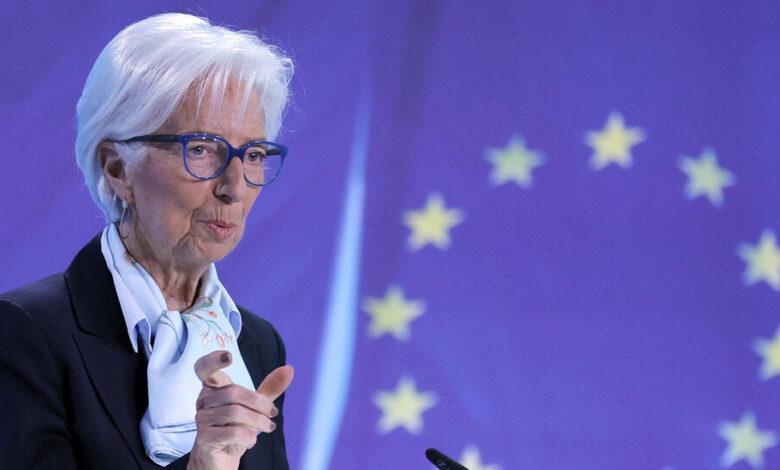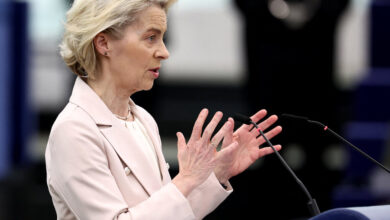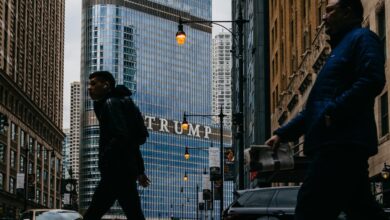Europe’s Fed Problem – The New York Times

The Fed’s shadow over the E.C.B.
Thursday is a big day for the European Central Bank. It is widely expected to lower interest rates by a quarter percentage point, its first cut since 2019 — and outpace the Fed in lowering borrowing costs. Investors will watch to see how that would influence monetary policy beyond Brussels, as well as its effect on global trade, stock markets and the dollar.
The big questions on our mind: Will Christine Lagarde, the central bank’s president, signal further cuts at its July and September meetings? And how far can the E.C.B. go if the Fed stays put?
The good news: Economists say the era of elevated rates around the world is coming to an end. But they add that sticky inflation will tie central bankers’ hands, limiting their ability to lower borrowing costs much.
Policymakers are most likely entering a “shallower for shorter” phase, Holger Schmieding, an economist at Berenberg Bank, told DealBook, in which the cuts are staggered and rates remain above prepandemic levels.
The E.C.B. is considered a step ahead of the Fed. The futures market on Wednesday saw one Fed rate cut before Election Day, probably in September. That said, those odds could change if Friday’s jobs report brings any surprises.
Watch the dollar and stocks. A rate cut by the E.C.B. would most likely push the dollar higher against the euro. That could be good news for European exporters like Airbus and automakers.
The same phenomenon could influence global investment flows. “In a scenario where the E.C.B. is cutting, and the Fed is not, this is likely to be positive for European equities and could see a period in which they outperform the U.S. S&P 500,” Dan McCormack, the head of research at the Macquarie Group, told DealBook.
The Fed remains another wild card. The U.S. economy has been robust, creating an inflation risk that has scrambled the Fed’s rate-cutting timeline. The longer the Fed leaves its rates unchanged, the more that could weigh on other central bankers who are worried that diverging policies would push up the dollar — and domestic inflation.
“The key question is how much can the E.C.B. deviate from the Fed, particularly if inflation remains sticky,” said Mohit Kumar, an economist and strategist at Jefferies. “In a scenario where the Fed doesn’t cut rates at all this year we see,” the E.C.B. making two rate cuts this year instead of three, he said.
HERE’S WHAT’S HAPPENING
Intel sells a stake in a chip plant in Ireland to Apollo for $11 billion. The deal will give the investment giant a 49 percent stake in the venture that owns the factory, and will provide Intel with funds to expand its manufacturing. Meanwhile, NXP Semiconductors announced plans to team up with a company associated with Taiwan Semiconductor Manufacturing Company to build a $7.8 billion chip wafer plant in Singapore.
Elliott Management is said to take aim at SoftBank, again. The activist hedge fund has amassed a big stake in SoftBank and is pushing the Japanese technology giant to buy back billions of dollars’ worth of its shares, according to The Financial Times. The reported investment by Elliott, which pressed for change at SoftBank in 2020, comes amid a widening gap between the value of the tech company’s holdings and its market value.
Apple reportedly held talks to bring its Apple TV+ streaming service to China. The tech titan was in discussions with China Mobile last year to do so, according to The Information. That would make Apple the only U.S. company to offer a streaming service in China — but talks may ruffle feathers politically: The U.S. government has deemed China Mobile, which is controlled by Beijing, a national security threat.
Wall Street giants back an upstart Texas stock market. Investors including BlackRock and Citadel have committed about $120 million to the Texas Stock Exchange, which says it will impose fewer requirements on listed companies than the New York Stock Exchange and the Nasdaq. The TXSE, as the exchange is known, faces long odds: Other challengers to the big markets have made little headway in eroding their dominance.
What next for India, Inc.?
Indian stock markets rebounded on Wednesday, but uncertainty remains as investors digest an election result that gave Prime Minister Narendra Modi a smaller-than-expected majority. The result could hamstring India’s most dominant political leader in decades as he works to form a coalition government.
Investment has been pouring into one of the world’s fastest-growing economies, and companies are trying to figure out what to expect next.
DealBook spoke to James Crabtree, the author of “The Billionaire Raj,” and an analyst on Indian business and politics, about the election result and what it means for business. This interview has been edited for clarity.
How big a shock is this?
It’s a major surprise. Modi had appeared impervious to the political pressures that apply to ordinary politicians.
Before Modi became prime minister, politics in New Delhi had revolved around a succession of weak coalition governments. Yet over the last decade, his grip on Indian politics has grown ever tighter. Modi’s party enjoyed a massive financial advantage, in an election that is estimated to have cost an astonishing $16 billion. And the country’s news media rarely criticizes him.
What kind of government will emerge, and what will this mean for the economy?
Markets typically equate weaker governments with less energy for growth-enhancing reforms. Particularly badly hit have been stocks perceived to have close political connections to Modi himself, notably businesses belonging to the tycoon Gautam Adani.
But many of India’s most important economic reforms have been delivered by coalition governments. The election result is also a check on worries that Modi was accumulating too much power. For all the support businesses sometimes give to strongman leaders, democracies can be good for free markets and global business.
What does this mean for international investors?
Global investor adulation for India has largely been driven by factors that have nothing to do with its government. Geopolitical tensions mean the U.S. and its allies will continue to see India as a regional bulwark against Beijing, and companies will still look for alternatives to China.
What next?
Investors will watch carefully to see who becomes the new finance minister and what they say about the country’s reform agenda.
But even if investors are kept happy, voters in the world’s biggest democracy will ultimately need to be convinced that the economy is delivering for them.
Waiting on Redstone
It has been more than 24 hours since Shari Redstone, Paramount’s controlling shareholder, received Skydance’s revised proposal for merging with the media giant. And yet all Wall Street has officially gotten is silence, even as a representative for her confirmed receipt of the offer.
Amid the quiet, here’s what we know, and what we wish we knew.
Paramount’s leaders have put forward a plan for a stand-alone company. At the media giant’s annual investor meeting Tuesday, the three members of its so-called Office of the C.E.O. introduced their vision for Paramount: finding a partner to help share the costs of running its Paramount+ streaming service, cutting $500 million in costs and selling noncore assets.
The presentation was meant to convey that Paramount doesn’t need to sell. At the meeting, Redstone told shareholders that she believed in the merits of the plan. But investors seemed unconvinced: The company’s shares fell more than 4 percent on Tuesday.
Reports of behind-the-scenes wrangling are adding to the intrigue. Is Redstone taking more time to negotiate a deal with potential rival suitors for National Amusements, the vehicle through which she controls Paramount?
Is she irked by Skydance changing its offer by lowering the proposed valuation of National Amusements, which created more cash to pay out to Paramount shareholders?
As often happens in deals, such reports may be meant to put pressure on one of the sides, whether that’s Skydance (to improve its offer) or Redstone (to get a deal done).
One thing we do know: Which party would assume liability for litigation over the deal remains an unresolved issue. It’s worth noting that this wouldn’t be a deal-breaker in most other transactions.
Everyone will have to keep waiting. That includes Paramount employees: The company’s leaders postponed an internal town hall meeting from Wednesday to June 25, citing the continuing talks.
Bill Gates goes back to his roots
Bill Gates has written books about climate change, technology and the coronavirus pandemic. Now, he is turning the lens on himself.
The Microsoft co-founder announced that he was writing “Source Code,” a memoir of his life before starting the tech giant. Penguin Random House is set to publish the book in February.
Gates wants to tell his origin story. The book will trace his life from his childhood to his decision to drop out of Harvard and start Microsoft with Paul Allen. It’s a period that isn’t well known, he wrote in a blog post on Tuesday.
The book will avoid contentious moments. “Source code” isn’t expected to touch on Microsoft or the Gates Foundation. And given the stated timeline, it also probably won’t venture into his relationship with the convicted sex offender Jeffrey Epstein or accusations of questionable behavior in work-related settings. Nor is it expected to get into his divorce from Melinda French Gates.
Expect more books on Gates soon, including two by Times journalists. “Billionaire, Nerd, Savior, King: Bill Gates and His Quest to Shape Our World,” by Anupreeta Das, The Times’s finance editor, comes out in August.
And a biography by Nicholas Kulish, a Times reporter who writes about philanthropy, is also in the works.
THE SPEED READ
Deals
-
Cohere, a fast-growing Canadian artificial intelligence start-up, is said to have raised $450 million from investors including Nvidia and Salesforce at a $5 billion valuation. (Reuters)
-
Hakluyt, a British consulting firm started by former spies, has raised more than $50 million for its first venture capital fund as it moves into Silicon Valley. (Bloomberg)
Election 2024
-
Trump is scheduled to attend fund-raising events in California this week, including at the home of the investor David Sacks — even as Republicans there are staying largely quiet about their party’s presumptive presidential nominee after his conviction last week. (Politico)
-
President Biden’s new immigration restrictions seek to address one of his biggest political vulnerabilities ahead of the election. (NYT)
Best of the rest
We want to take a moment to remember Ben White, a former Times colleague who died on Saturday. Ben was a smart and insightful reporter on Wall Street and the economy, who was generous with his time and notebook. He will be deeply missed.
We’d like your feedback! Please email thoughts and suggestions to dealbook@nytimes.com.



